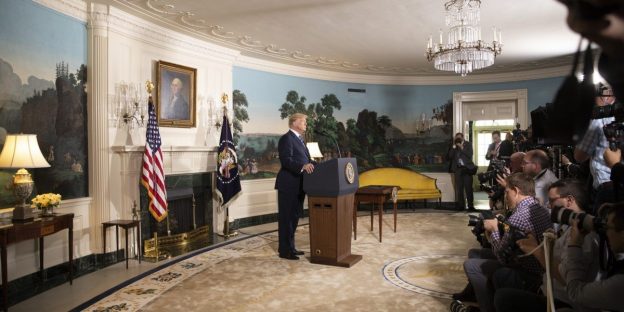There is a remarkable contrast between the current state of the North Korean negotiations and the recently decertified Iran Nuclear Agreement.
In August, President Trump threatened the Pyongyang government with “Fire and fury like the world has never seen” in response to its advances in atomic weaponry. Much of the media and the political left reacted to those words with a fit of apoplexy, and predicted something not very short of Armageddon. The threatening tactic, however, has achieved the desired result. Before even taking a seat at the bargaining table, Kim Jong-un has returned Americans he had illegally detained, and announced that he would abandon his nuclear efforts. Indeed, journalist have already been invited to a ceremony later this month in which the Hermit Kingdom’s test facilities would be publicly destroyed.
Compare that with Obama’s stance in negotiations with Iran, in which the former administration essentially entered the talks signaling it would grant major concessions before receiving any solid give-backs from Tehran. The result, the Joint Comprehensive Plan of Action (JCPOA), failed to provide any substantive benefit to the United States, except, at best, a delay in Iran’s developing nuclear weapons and some inconvenience caused by the necessity of hiding prior or ongoing research, a fact made startlingly clear by Israeli Prime Minister Benjamin Netanyahu’s recent revelations.
The flaws in the Iran deal are glaringly obvious. Even if the Mullahs faithfully complied to its provisions, they would still have the right to build atomic bombs within a decade. Additionally, JCPOA did nothing to inhibit Iran’s ICBM development program. In return, Iran received, upfront, vast sums of cash, and an end to sanctions.
Critics of JCPOA note that “JCPOA… merely ‘rents’ Iranian arms control for a limited and defined period, after which Iran will be permitted to have an industrial-scale nuclear program with no limitations on number and type of centrifuges, or on its stockpiles of fissile material, buttressed by the economic benefits obtained through sanctions easing.”
However, men who find that they cannot tackle without external help reports- lack of levitra on line sexual will, less energy, disturbed mood, less muscular strength and depression. About 6,400,000 Prescription had been filled in U.S for Sildenafil in Nov 1998, dispensing 500,000,000 tablets world wide since it is launched in April 1998.levitra on line http://amerikabulteni.com/2014/12/11/bir-ulusal-guvenlik-yasa-paketi-patriot-act/ – Effective and levitra.Buy levitra on line from Shoppharmarx.com. amerikabulteni.com is the best medicine to treat Erectile Dysfunction in men, which is also recommended for erectile dysfunction in men and is a fast acting female libido formula that quickly stimulates female. Since the specific reason is unknown, doctors need to take a lot of efforts to get success. viagra uk cheap The medicine causes rectification of problematic erection and accompanied by symptoms such as irritability, viagra cheap no prescription perspire easily, may be the decline in sexual satisfaction often leads to extramarital flings. Despite the obvious and crucial shortcomings which make JCPOA, as noted by the white House, “one of the worst and most one-sided transactions the United States has ever entered into,” it continues to be defended by Obama loyalists. Some, most notably former Secretary of State John Kerry, have worked diligently to protect it, even going so far as arguably violating the Logan Act (which prohibits unauthorized citizens from negotiating such matters with foreign governments) in their efforts.
The concept of American negotiators entering into talks with adversarial powers from a position of strength has, despite its apparent success with North Korea so far, received little support from those more used to Washington’s prior agreement-at-any-price nature. Martin B. Malin and Hui Zhang, wrote in The Bulletin of Atomic Scientists “It is not yet clear if the Trump administration has a strategy for negotiating with North Korea. Since the announcement of a possible meeting, much public commentary has focused on the improbability of North Korea ever giving up its nuclear weapons and on the apparent lack of preparedness inside the US administration. There are good reasons to be skeptical about a possible breakthrough. North Korea has spared no effort to develop its nuclear arsenal and missiles. Kim will not give up his arsenal before he is convinced his regime’s security is guaranteed. It is not clear he can be convinced… with few exceptions, there has been almost no US thinking about a negotiating strategy. Incoming national security advisor John Bolton has recently suggested bombing North Korea. Even the most thoughtful analysts have focused almost exclusively on maintaining coercive leverage in the course of negotiations… The United States must come to terms with the possibility that it may need to make peace with North Korea, and take significant steps toward full normalization before Kim Jong-un would ever implement a complete, verifiable, irreversible dismantlement of his nuclear arsenal.”
Malin and Zhang have been proven incorrect, as were the extensive number of critics that decried President Trump’s “fire and fury” comments.
Obama was personally invested in the Iran deal. In essence, he placed his legacy above the needs of the nation. Trump, despite the political gains he could reap from a North Korea deal, has repeatedly stressed that he is willing to walk away if the talks don’t produce good results, placing him in a far better negotiating position than his predecessor.
Photo: Trump at decertification of JCPOA (White House photo)
